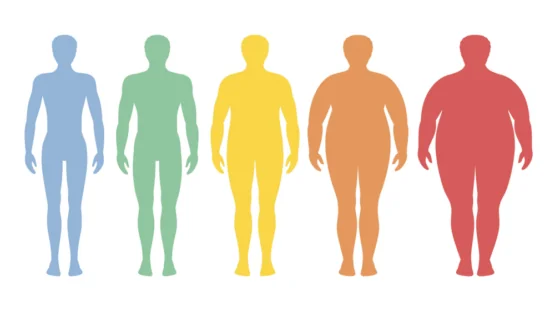Scientists publishing in Nature Metabolism have shown that obese people have dampened brain responses to food. This effect lingers even after diet-induced weight loss, possibly explaining why it is easy to regain weight [1].
Getting and staying lean is hard
Obesity is a certified killer. It drives many pathological conditions and substantially increases all-cause mortality [2]. While people are becoming more aware of those detrimental effects of obesity, losing weight is not easy, and many people fail to stay lean after initial weight loss. Countering the social stigma around obesity, recent research has found objective biological reasons for why losing and/or not regaining weight can be an uphill battle. For instance, we have previously reported that in mice, weight loss leads to increased energy efficiency, which can make not overeating harder.
Straight to the stomach
This new study from Yale was done in humans. The researchers set out to determine whether nutrient sensing by the brain differs in obese and formerly obese people compared to lean people. The sensations that people receive when eating (orosensory effects) are a major driver of overeating. To get past these effects, the researchers used intragastric delivery of nutrients via a plastic tube inserted in a nostril.
The study began with a group of 30 lean people and a group of 30 obese people. For several days, the researchers delivered equal volumes of either tap water (control), glucose-containing water, or fat-containing water to the stomach and monitored the brain’s responses for half an hour using functional MRI (fMRI).
Lack of response
In lean people, delivery of either glucose or fat altered the activity of several brain regions associated with food behavior, such as the striatum, although the responses for each nutrient type differed. However, there was a notable lack of response in the obese participants.
“This was surprising,” said Mireille Serlie, lead investigator of the study and a professor of medicine at Yale. “We thought there would be different responses between lean people and people with obesity, but we didn’t expect this lack of changes in brain activity in people with obesity.”
In the second part of the experiment, the obese participants underwent a 12-week diet. The average weight loss amounted to 9.5%, and only participants who lost at least 5% of their body mass were allowed to continue. After dieting, those participants were again given nutrients intragastrically for several days. To the researchers’ surprise, weight loss did not change the picture: the participants still lacked the brain response seen in lean people.
The striatum is essential in regulating behavioral responses to food intake and probably acts as a caloric sensor [3]. It is thought to be doing so, in part, by releasing the neurotransmitter dopamine. Glucose triggered striatal dopamine release in all groups. However, dopamine release after a fat infusion only happened in lean participants. Both obese participants and participants who lost weight showed impaired dopamine response. The researchers hypothesize that this lack of dopamine response may at least partially explain the widespread phenomenon of weight regaining.
“In my clinic, when I see people with obesity, they often tell me, ‘I ate dinner. I know I did. But it doesn’t feel like it,’” said Serlie. “And I think that’s part of this defective nutrient sensing. This may be why people overeat despite the fact that they’ve consumed enough calories. And, importantly, it might explain why it’s so hard to keep weight off.”
Lacking or delayed?
The study had several limitations, such as the relatively short duration of follow-up (12 weeks). Another study by the same group showed partial recovery of dopaminergic response impaired by obesity in women who underwent bariatric surgery [4]. However, in that study, average weight loss was higher and the follow-up period much longer (two years).
Since the fMRI sessions lasted only 30 minutes, it is possible that normal responses were rather delayed than lacking. However, as the researchers note, such a delay is enough to affect eating behavior, for instance, by preventing meal termination.
“People still think obesity is caused by a lack of willpower,” said Serlie. “But we’ve shown that there is a real difference in the brain when it comes to nutrient sensing.” However, more research is apparently needed in this area.
Literature
[1] van Galen, K.A., Schrantee, A., ter Horst, K.W. et al. (2023). Brain responses to nutrients are severely impaired and not reversed by weight loss in humans with obesity: a randomized crossover study. Nat Metab.
[2] Di Angelantonio, E., Bhupathiraju, S. N., Wormser, D., Gao, P., Kaptoge, S., de Gonzalez, A. B., … & Hu, F. B. (2016). Body-mass index and all-cause mortality: individual-participant-data meta-analysis of 239 prospective studies in four continents. The Lancet, 388(10046), 776-786.
[3] Ferreira, J. G., Tellez, L. A., Ren, X., Yeckel, C. W., & de Araujo, I. E. (2012). Regulation of fat intake in the absence of flavour signalling. The Journal of physiology, 590(4), 953-972.
[4] van der Zwaal, E. M., de Weijer, B. A., van de Giessen, E. M., Janssen, I., Berends, F. J., van de Laar, A., … & Serlie, M. J. (2016). Striatal dopamine D2/3 receptor availability increases after long-term bariatric surgery-induced weight loss. European Neuropsychopharmacology, 26(7), 1190-1200.




